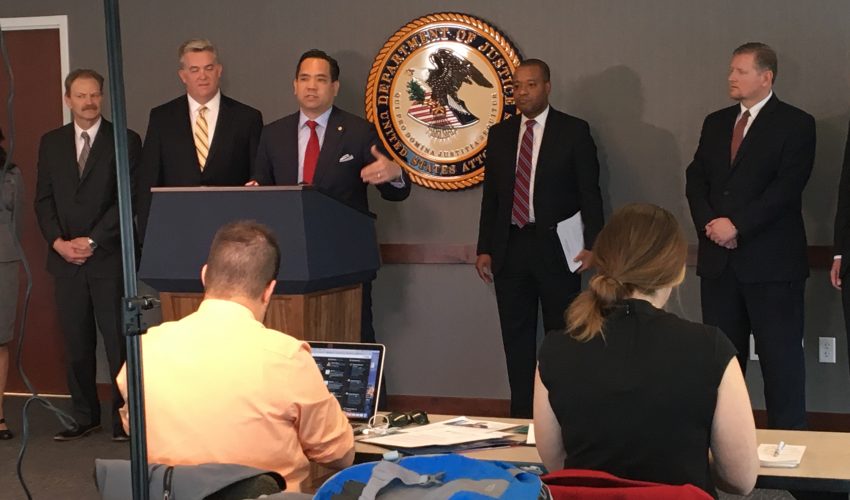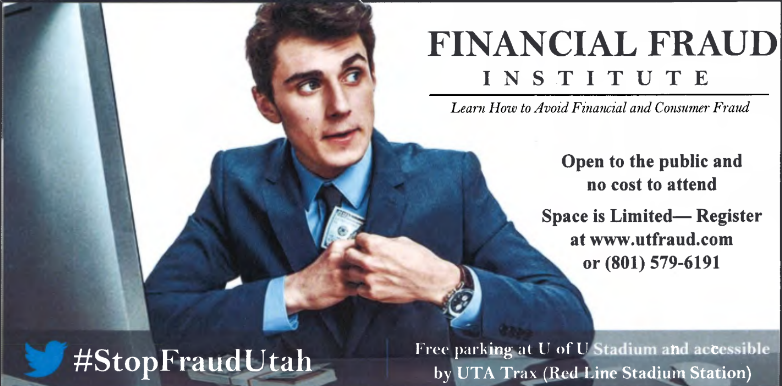The Commodity Futures Trading Commission and the Utah Department of Commerce, Division of Securities released the following after charging a Salt Lake City precious metals dealer for allegedly defrauding over 200 individuals in a Ponzi scheme. A special thank you to Assistant AGs Robert Wing, Tom Melton, Jennifer Korb, and Paula Faerber for their hard work and commitment on this case as they serve our partners, clients, and the people of Utah.
FOR IMMEDIATE RELEASE
November 16, 2018
CFTC and State of Utah Charge Salt Lake City Precious Metals Dealer and His Company with Engaging in $170 Million Precious Metals Ponzi Scheme
Washington, DC — The Commodity Futures Trading Commission (CFTC) and the Utah Department of Commerce, Division of Securities, through its Attorney General, jointly filed a civil enforcement action in the U.S. District Court for the District of Utah, Central Division, against Defendants Gaylen Dean Rust (Rust) and Rust Rare Coin, Inc. (RRC) of Layton, Utah and Salt Lake City, Utah, respectively. The Complaint charges Rust and his company RRC with defrauding at least 200 individuals — from Utah and at least 16 other states — and fraudulently obtaining more than $170 million from investors since May 2013 in a precious metals Ponzi scheme.
According to the complaint, the Defendants’ fraud, as alleged, is ongoing. In the first eight months of 2018, the Defendants received at least $42 million from investors in a pool that purportedly bought and sold silver. The Defendants also attempted to solicit new investors in this pool at least as recently as October 8, 2018, as alleged in the Complaint.
Court Freezes Defendants’ Assets and Appoints a Temporary Receiver
On November 15, 2018, the Honorable Tena Campbell, U.S. District Court Judge for the District of Utah, entered a restraining order freezing the assets of the Defendants and the Relief Defendants and permitting the CFTC and the State of Utah to inspect all relevant records of the Defendants and the Relief Defendants. The Court also appointed Jonathan O. Hafen as a temporary receiver to take control of RRC and the corporate Relief Defendants, as well as the assets of Rust and the individual Relief Defendants.
CFTC Director of Enforcement Comments
Director of Enforcement James McDonald commented, “As alleged, for at least a decade, the Defendants defrauded their friends, customers, and business associates out of more than $170 million. The Defendants allegedly concealed their fraud with false account statements and Ponzi payments; however, their scheme was brought to light through the combined efforts of the CFTC and our law enforcement partners. This is yet another example of the CFTC’s commitment to coordinate with our law enforcement partners both to protect our markets from fraud and to ensure that wrongdoers are held accountable. I’m grateful to the Utah Department of Commerce, Division of Securities and Utah’s Attorney General and their staffs for their assistance in this matter.
Defendants’ Deceptive and Fraudulent Precious Metals Scheme
According to the Complaint, from at least as early as 2008 and continuing through the present, the Defendants tricked investors into believing that the Defendants were pooling investor money for the purpose of entering into contracts of sale for silver, a commodity in interstate commerce (Silver Pool). As alleged, the Defendants told investors and prospective investors that they would sell silver held in the pool as market prices rose and buy silver for the pool as market prices fell; thereby increasing the amount of silver held in the Silver Pool, as well as the value of each investor’s share in that pool.
As alleged in the Complaint, the Silver Pool was a sham. The Defendants falsely told investors and prospective investors in the Silver Pool that by trading silver in this manner, they generated extraordinarily high profits, averaging 20 to 25 percent per year and sometimes as high as 40 percent per year or more. The Defendants provided investors with false account statements that showed every trade made by the Defendants as being profitable. The Defendants also told investors that the Silver Pool possessed approximately $77 to $80 million of silver, which was stored at Brink’s, Incorporated (Brink’s) depositories in Salt Lake City, Utah and/or Los Angeles, California, even though the Defendants never purchased and stored anything approaching that amount at Brink’s.
According to the Complaint, the Defendants did not use contributions from investors to purchase silver for the Silver Pool. Instead, the Defendants misappropriated investor funds and used these funds to make payments to other investors in the manner of a Ponzi scheme, transfer money to other companies owned by Rust, and pay personal expenses.
In their continuing litigation against the Defendants, the CFTC and the State of Utah seek disgorgement of ill-gotten gains, civil monetary penalties, restitution, permanent registration and trading bans, and a permanent injunction against further violations of the Commodity Exchange Act, CFTC Regulations, and Utah securities laws, as charged.
The CFTC acknowledges and appreciates the cooperation and assistance of the Utah Department of Commerce, Division of Securities; the Utah Attorney General’s Office; the Federal Bureau of Investigation; the U.S. Attorney’s Office for the District of Utah; and the Securities and Exchange Commission, Salt Lake City Regional Office.
CFTC Division of Enforcement staff members responsible for this action are Jenny Chapin, Stephen Turley, Thomas Simek, Joyce Brandt, Christopher Reed, and Charles Marvine.
CFTC’s Precious Metals Customer Fraud Advisory
The CFTC has issued several customer protection Fraud Advisories that provide the warning signs of fraud, including the Precious Metals Fraud Advisory, which alerts customers to precious metals fraud and lists simple ways to spot precious metals scams.
Customers can report suspicious activities or information, such as possible violations of commodity trading laws, to the CFTC Division of Enforcement via a Toll-Free Hotline 866-FON-CFTC (866-366-2382) or file a tip or complaint online.
Photo by Pepi Stojanovski




